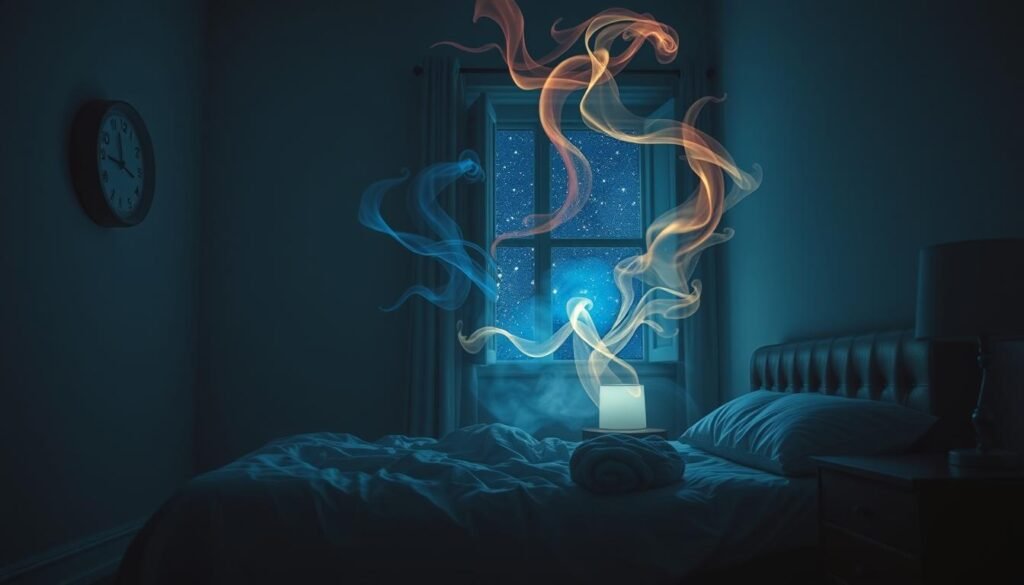Did you know about 30% of US adults often experience insomnia symptoms? This fact shows how many people struggle to get good sleep. Insomnia thoughts—the busy, racing ideas—make it hard to find peaceful sleep. It’s key to understand insomnia and the deep thoughts that keep us awake. This article looks into how mental health and sleep are connected. We’ll discover ways and tips to help manage insomnia thoughts in everyday life.
Key Takeaways
- Intrusive thoughts can significantly hinder sleep quality.
- Understanding insomnia is essential to developing effective coping strategies.
- Cognitive Behavioral Therapy for Insomnia (CBTi) has proven effective for managing sleep disturbances.
- Articulatory suppression and imagery distraction are notable methods to combat intrusive thoughts at night.
- Focusing on positive thoughts before bed can enhance sleep benefits.
- Mental healthcare plays a vital role in improving sleep quality through addressing underlying mental health issues.
The Impact of Insomnia on Daily Life
Insomnia greatly disrupts lives. It hits physical, emotional, and mental health. People struggle with sleepless nights, reducing their work output and health. Chronic insomnia means sleeping troubles for more than three nights weekly for over three months. This situation keeps the cycle of insomnia going.
Understanding the Cycle of Restless Nights
For many, a good night’s rest seems hard to achieve. The effects of not sleeping well lead to tiredness, mood swings, and trouble thinking. People might feel overly alert by day but can’t sleep at night. Studies show that issues like hormone shifts, higher heart rates, and discomfort worsen sleep problems. Lack of sleep increases stress, making insomnia harder to escape. For a deep dive into insomnia and health, check WebMD.
How Sleep Anxiety Affects Well-Being
Sleep anxiety makes insomnia worse. It happens when people worry too much about sleeping well. This worry promotes negative thinking, making sleep even harder. This worry worsens the restless night cycle and blocks refreshing sleep, raising anxiety more. These problems change how we do daily tasks and interact with others, boosting levels of stress and affecting our well-being. For insights into managing these symptoms, see Biotin Bloom.
Common Causes of Insomnia Thoughts
To understand causes of insomnia thoughts, we should look at today’s worries. Many people deal with pressures from all sides, affecting their sleep. From money problems to work stress, these issues are important to note. They help us find what might keep us up at night.
Stressors in Modern Life
Today’s world is full of stressors that mess with our sleep. Here are a few:
- Financial worries, causing anxiety about stability.
- Work stress, like deadlines and responsibilities.
- Family issues, adding emotional stress.
- Health concerns, making relaxation hard.
These stressors keep us alert, making sleep hard to come by. Adults often face short-term insomnia, while ongoing stress can lead to chronic insomnia.
How Mental Health Plays a Role
Anxiety and depression are common with insomnia. The mental health effects of these can make sleeping harder, including:
- Racing thoughts that stop relaxation.
- Increased stress sensitivity, leading to emotional overload.
- Sleep disruptions from meds, like antidepressants.
These issues make getting 7 to 9 hours of sleep tough. Over 40% of people with insomnia also have a mental health issue. This shows the strong link between our minds and how well we sleep.

Recognizing Intrusive Thoughts at Night
At night, understanding intrusive thoughts is key for battling insomnia. A mind that won’t slow down is a big obstacle to sleep. These sudden thoughts interrupt the peace we seek.
The Nature of Racing Mind
Stress, like job loss or money troubles, often causes a racing mind. People trying to relax at night are bothered by these thoughts. Those with OCD might face sleep issues far more often.
This shows how linked mental health and sleep are. Poor sleep makes OCD worse, leading to a distressing loop.
Understanding Nighttime Worry
Worry at night is common for those who find sleeping hard. Life changes can make these worries worse. For example, African American adults often struggle more with sleep quality.
Writing down worries or meditating can ease nighttime anxieties. Treatments like exposure and response prevention therapy and cognitive behavioral therapy can help. They deal with intrusive thoughts and calm the mind.

How Overthinking Interferes with Sleep
Overthinking can really affect how well you sleep, creating a cycle of restless nights. When someone gets caught in a loop of rumination, thoughts just keep leading to more thoughts. This makes it tough to relax and get a good night’s sleep. It’s key to understand how thinking too much at night affects sleep.
The Rumination Loop Explained
The rumination loop means having the same negative thoughts over and over again. About 30% of adults have trouble sleeping due to these kinds of thoughts. When people notice they can’t sleep, they often stress out more, not less. But writing down worries or making an action plan can help. This lets someone figure out their problems and how to solve them.
Identifying Cognitive Arousal
Cognitive arousal means your mind is too alert to fall asleep. Doing exciting activities or looking at screens before bed can make this worse. Instead, try turning off screens a few hours before sleep. Calming activities or a short time organizing your next day can help your body get ready for sleep. These steps can make falling asleep easier by calming your mind.

| Practice | Benefit | Duration |
|---|---|---|
| Writing Stressors | Identifies concerns and creates clarity | 5-10 minutes |
| Calming Activities (reading, music) | Promotes relaxation | 30 minutes |
| Screen Time Reduction | Improves sleep quality | 2-3 hours before bed |
Dealing with Impacts of Sleep Maintenance Insomnia
Sleep maintenance insomnia breaks up your night with frequent wake-ups. It’s key to spot the patterns that keep you awake. By noticing what messes with your sleep, you can take steps to sleep better.
Patterns That Keep You Awake
Many things can mess with sleep patterns, especially with sleep maintenance insomnia. For women, changes like perimenopause often disrupt sleep with symptoms like hot flashes. Stress or worry can make it hard to stay asleep. Bad habits, like off sleep schedules or too much caffeine, play a role too. Knowing these can help you find solutions.
Tips for Managing Sleep Interruptions
To handle sleep disruptions well, try different methods:
- Start a calming routine before bed to get your body ready to sleep.
- Make your bedroom cooler and quieter.
- If you can’t sleep after 20 minutes, do something relaxing to help you feel sleepy.
- Consider talking to a specialist for help with sleep-related issues.
Making these changes can improve your sleep. Better sleep leads to a happier and healthier life.
Techniques to Manage Insomnia Thoughts
Handling thoughts that keep you from sleeping is key to beating insomnia. Techniques for insomnia provide helpful ways to calm your mind and relax. Two effective methods are articulatory suppression and imagery distraction.
Articulatory Suppression Methods
Articulatory suppression is about repeating a word or phrase to stop unwanted thoughts. It helps shift your focus and quiet the thoughts that prevent sleep. This method aids relaxation and improves sleep.
Using it regularly makes it more effective in managing thoughts.
Imagery Distraction Techniques
Imagery distraction means thinking of peaceful scenes. Imagine quiet places, the soft sound of waves, or a happy memory. This helps you move away from thoughts that cause stress.
Adding these techniques for insomnia to your nighttime routine can greatly help your sleep.
Cognitive Behavioral Therapy for Insomnia (CBTi)
Cognitive Behavioral Therapy for Insomnia (CBTi) uses special techniques to fix insomnia. It changes negative thoughts about sleep into positive ones. This therapy teaches vital skills to overcome sleeplessness.
Understanding How CBTi Works
CBTi sessions last between six to eight times, but it depends on the person. It includes Sleep Restriction Therapy (SRT) and Stimulus Control Therapy (SCT). SRT improves sleep by reducing time in bed.
SCT teaches good sleep habits, like using the bed only for sleep and being close. Relaxation methods, like breathing well and muscle relaxation, are also used. They help lessen anxiety and boost calmness.
Benefits of Professional Support
Getting help from a pro makes CBT for insomnia work better. Experts customize the plan to fit the patient’s needs. This personal touch helps about 70% to 80% of patients sleep better.
Working with a specialist ensures the right use of relaxation and mind-changing techniques. To find a good therapist, check the American Psychological Association for certified professionals.
Using cognitive behavioral therapy for insomnia leads to better sleep. It helps people enjoy peaceful nights and improves life quality. Click here for more info on tackling insomnia.
Practical Strategies to Calm Your Mind
To improve sleep quality, it’s vital to apply effective mind-calming strategies. Adopting a routine that includes good sleep hygiene is key. Alongside, using techniques that boost positive thinking is beneficial. These strategies for better sleep lead to peaceful nights and enhance well-being in daily life.
Good Sleep Hygiene Practices
Having a set sleep routine greatly improves sleep hygiene. One should aim for a consistent bedtime and ensure the sleeping area is dark, quiet, and cool. It also helps to avoid things like caffeine and electronics two hours before bed. This makes falling asleep easier.
Simple activities such as taking a warm bath, reading, or gentle stretches can prepare the body for rest. Adding these practices may reduce stress and help with relaxation.
The Power of Positive Thinking Before Bed
Thinking positively before sleep can greatly improve its quality. Reflecting on grateful moments or imagining peaceful scenes helps calm the mind. Studies show that meditating for just 30 minutes a day can change the brain positively in just two weeks.
Visualization can block negative thoughts, helping to quiet the mind. Deep breathing, like diaphragmatic breathing, also helps by slowing the heartbeat and lowering blood pressure. This triggers relaxation, helping you fall asleep more easily.
In conclusion, mixing positive thinking with good sleep hygiene is a strong strategy. It’s great for those wanting restful sleep and better mental clarity.
Conclusion
Almost a third of U.S. adults struggle with insomnia, affecting more than just their nights. This article sheds light on how key it is to tackle insomnia thoughts for better well-being. We’ve talked about strategies like cognitive-behavioral therapy (CBTi), improving sleep habits, and mind-calming techniques to fight insomnia.
The role of self-perception in dealing with insomnia is crucial. Some think they have insomnia when their sleep is okay. Those who do feel they have insomnia often face more anxiety and depression. Using the right strategies can help stop symptoms from getting worse. This allows people to improve their sleep and health.
By using these methods, those with insomnia can hope for better sleep and daily life. It’s about thinking positive and practicing healthy sleep habits to end the sleepless cycle. Future research on how we see insomnia could help us understand and manage it better. For a deeper look, visit this discussion on insomnia management.